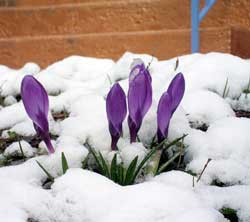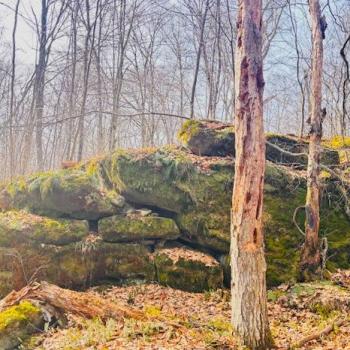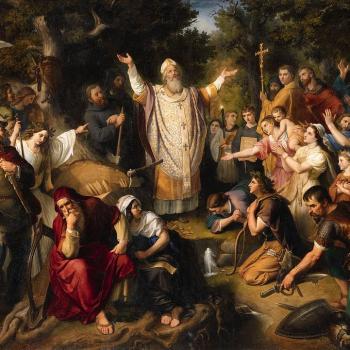By Sandra Lommasson
Note: Each week's reflection is intended for communal examination with at least one other person in a small faith, work, or family community as part of the annual six-week ‘retreat' of Lent. The intent is to notice with freshness our own impact in a community and to name that aloud to others in the community in mutual revelation. See the introduction to the series, "Tending the Communal Laundry," for more on this approach.
Expansion and contraction.
Increase and decrease.
In-breath and out-breath.
Life and death and life and death and life and...
 Each belongs to the other in ways that are deeply mysterious, a part of a whole rhythm within which the radiance of God shimmers. Rightly received, it calls us to humility, to a courageous heart, and to ‘the things that make for peace.' Peace -- shalom -- or the wholeness of life and relationship, accepts every aspect of the ebb and flow, including its apparent end.
Each belongs to the other in ways that are deeply mysterious, a part of a whole rhythm within which the radiance of God shimmers. Rightly received, it calls us to humility, to a courageous heart, and to ‘the things that make for peace.' Peace -- shalom -- or the wholeness of life and relationship, accepts every aspect of the ebb and flow, including its apparent end.
On the fifth and sixth Sundays of the annual church retreat called Lent, the Gospels of each lectionary cycle highlight the interplay between what we typically configure as enemies. In John's story of the death and raising of Lazarus, first Martha and then Mary cry out their pain to Jesus, "Lord, if you had been here, my brother would not have died!" In this familiar cry of the heart, life and healing is perceived in the visible presence of God while death and brokenness dwell in the perceived absence of God: "Lord, if you had been here..." The permutations are endless, but the view is consistent: what we perceive as the desirable and the good is opposed by a harm-bringing enemy, an opposite. But is it, really?
While the response of the Christ is tender-to-tears for the real human suffering present in this perspective, there is also clarity of perception that what seems so pointless and cruel is part of a much larger weaving: "This illness does not lead to death; rather it is for God's glory..."(John 11:4). It's very similar to the response of Jesus the Christ to queries about the man born blind, "Neither this man nor his parents sinned. He was born blind so that God's works might be revealed in him" (John 9:3). And it is implicit in the Palm Sunday text with the focused heart of Luke's Jesus in entering Jerusalem knowing what awaits him. The whole human experience with its rhythms of expansion and contraction, increase and decrease, life and death -- all of it -- is held in the hands of Love.
What will it take to help us finally see that the entire cycle is God-breathed? That's the Easter story, but for now, for those with ears to hear, the in-the-bones knowing of this truth frees even the stones to cry out in jubilant proclamation as Jesus the Christ enters Jerusalem moving with sure steps toward his own death. The one who comes as "king" of this truth is one who again is tender-to-tears, not for his own fate but for the still blind and deaf City of Peace (Jeru + shalom), which does not know the secret of its own treasure: "If you, even you, had only recognized on this day the things that make for peace! But now they are hidden from your eyes."
There is a cost to such blindness and deafness and hardness of heart. There is a cost to our blindness and deafness and hardness of heart as we refuse in ongoing ways to trust the living presence of God to accompany us through every aspect of what life brings. Any effort to ward off the natural rhythm of increase and decrease, life and death in our relational lives, in our self-understanding, and in the cycle of our work in the world kills the very things we seek most desperately to protect. That is when circumstance becomes crushing to the spirit, and the meeting of ‘enemies' within and among us becomes an occasion of staggering loss. The inability to recognize "the time of our visitation from God" (Luke 19:44) in and through everything that comes -- not the things themselves -- is what gives the ‘enemy' power.
As we come to the end of the communal Lenten retreat, the time for annual examination of the quality of life together, you might ask,
- What among us in this last year is moving toward death and what has been our response?
- What part of the natural God-breathed cycle do I/we most fear and resist in our life together?
- If we chose to pray this time of passage rather than resisting it or moving it prematurely toward our version of what it will look like and mean, what might be freed among us?




